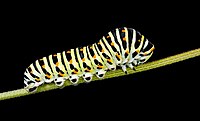
Effects of Lymantria dispar multiple nucleopolyhedrovirus and Bacillus thuringiensis var. kurstaki on different larval instars of Lymantria dispar asiatica.
Sign Up to like & getrecommendations! Published in 2023 at "Archives of insect biochemistry and physiology"
DOI: 10.1002/arch.22002
Abstract: Outbreaks of Lymantria dispar asiatica (the Asian spongy moth; Lepidoptera: Erebidae) occur sporadically, causing widespread damage to forest and fruit trees. Owing to the development of pesticide resistance and environmental contamination, biopesticides, including L. dispar multiple… read more here.
Keywords: larval; dispar multiple; lymantria dispar; dispar asiatica ... See more keywords

Genetic structure and demographic history of Lymantria dispar (Linnaeus, 1758) (Lepidoptera: Erebidae) in its area of origin and adjacent areas
Sign Up to like & getrecommendations! Published in 2017 at "Ecology and Evolution"
DOI: 10.1002/ece3.3467
Abstract: Abstract We analyzed the population genetic structure and demographic history of 20 Lymantria dispar populations from Far East Asia using microsatellite loci and mitochondrial genes. In the microsatellite analysis, the genetic distances based on pairwise… read more here.
Keywords: history lymantria; group; structure demographic; demographic history ... See more keywords

Stress response of Lymantria dispar asiatica (Lepidoptera: Erebidae) larvae and its gut microbiota to manganese ion
Sign Up to like & getrecommendations! Published in 2020 at "Journal of Forestry Research"
DOI: 10.1007/s11676-020-01160-4
Abstract: To study the effect of manganese exposure on the herbivorous insect Lymantria dispar asiatica, fourth-instar larvae were fed a MnCl 2 -amended diet (LdMn) for 84 h (0.40 mmol MnCl 2 /g diet). Larvae were weighed before… read more here.
Keywords: dispar; stress; dispar asiatica; larvae ... See more keywords

Cadmium and high temperature effects on brain and behaviour of Lymantria dispar L. caterpillars originating from polluted and less-polluted forests.
Sign Up to like & getrecommendations! Published in 2017 at "Chemosphere"
DOI: 10.1016/j.chemosphere.2017.07.050
Abstract: Insects brain as a part of nervous system is the first-line of fast stress response that integrate stress signals to regulate all aspects of insect physiology and behaviour. The cadmium (Cd) bioaccumulation factor (BF), activity… read more here.
Keywords: dispar caterpillars; temperature; less polluted; activity ... See more keywords

Sensitivity of midgut physiological parameters of Lymantria dispar L. larvae to benzo[a]pyrene in populations with different multigeneration contact to environmental pollutants.
Sign Up to like & getrecommendations! Published in 2021 at "Environmental pollution"
DOI: 10.1016/j.envpol.2021.117706
Abstract: Accumulation of organic pollutants in the environment calls for sensing physiological parameters adequate to indicate the presence of contaminants and their effects on ecosystems. Evidence points to the importance of insect adaptations in their habitats… read more here.
Keywords: dispar larvae; physiological parameters; benzo pyrene; larvae ... See more keywords

Idesia polycarpa (Salicaceae) leaf constituents and their toxic effect on Cerura vinula and Lymantria dispar (Lepidoptera) larvae.
Sign Up to like & getrecommendations! Published in 2017 at "Phytochemistry"
DOI: 10.1016/j.phytochem.2017.08.008
Abstract: Phytochemical investigation of Idesia polycarpa (Salicaceae) resulted in the structure elucidation of nine previously undescribed phenolic natural products along with six known compounds. The compounds are structurally related to salicinoids that are known defense compounds… read more here.
Keywords: polycarpa salicaceae; cerura vinula; larvae; idesia polycarpa ... See more keywords

Effects of Dietary Iron Quantities and Sources on Lymantria dispar (Lepidoptera: Erebidae) Survival and Development
Sign Up to like & getrecommendations! Published in 2022 at "Environmental Entomology"
DOI: 10.1093/ee/nvac043
Abstract: Abstract Lymantria dispar L. is a serious invasive defoliator of broadleaf trees in both North America and Eurasia. When rearing L. dispar for research, the artificial diet must have a source of iron that is… read more here.
Keywords: lymantria dispar; iron; development; effects dietary ... See more keywords

Tracking invasions of a destructive defoliator, the gypsy moth (Erebidae: Lymantria dispar): Population structure, origin of intercepted specimens, and Asian introgression into North America
Sign Up to like & getrecommendations! Published in 2020 at "Evolutionary Applications"
DOI: 10.1111/eva.12962
Abstract: Genetic data can help elucidate the dynamics of biological invasions, which are fueled by the constant expansion of international trade. The introduction of European gypsy moth (Lymantria dispar dispar) into North America is a classic… read more here.
Keywords: lymantria dispar; gypsy moth; introgression; population ... See more keywords

Lymantria dispar (L.) (Lepidoptera: Erebidae): Current Status of Biology, Ecology, and Management in Europe with Notes from North America
Sign Up to like & getrecommendations! Published in 2022 at "Insects"
DOI: 10.3390/insects13090854
Abstract: Simple Summary In the current review, we gathered and summarized the up-to-date information on the life cycle, distribution, outbreaks, control, and health issues to humans and animals of the European Spongy moth. Overall, this noxious… read more here.
Keywords: ecology; lymantria dispar; dispar lepidoptera; management ... See more keywords